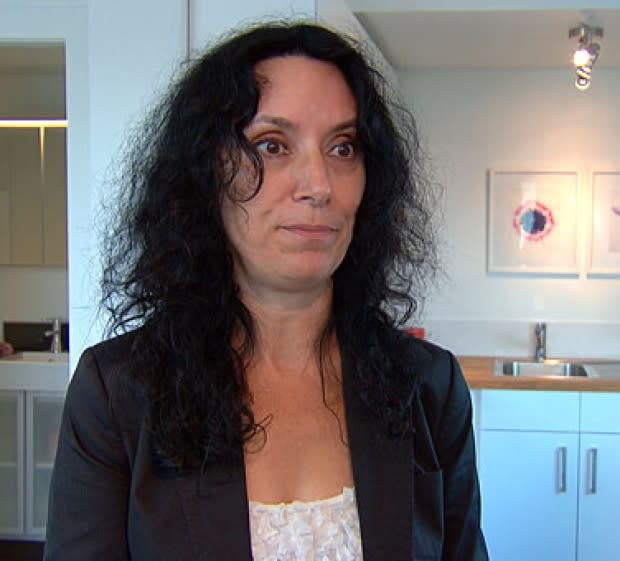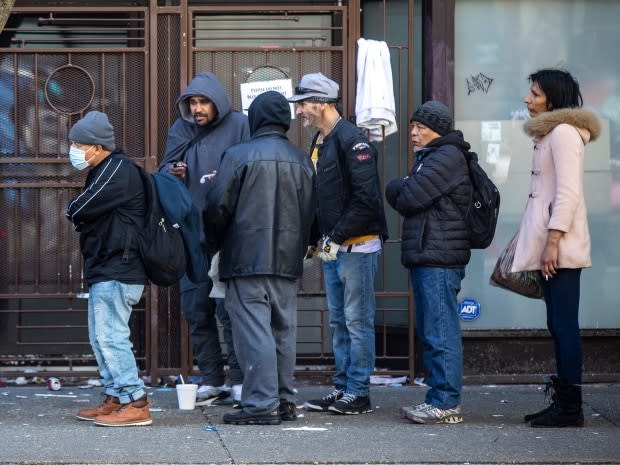60-room care facility unveiled in Vancouver's Downtown Eastside as area braces for COVID-19
A 60-room COVID-19 care facility is being created in Vancouver's Downtown Eastside, in a pre-emptive strike to stop the spread of the coronavirus among the city's poorest residents.
The facility has been set up in an unnamed hotel, which has been leased by B.C. Housing and is being operated by Atira Property Management.
The goal is to provide rooms for those with mild symptoms who might need to be isolated, but don't require hospitalization — and in the process, keep the virus from spreading on the street.
Medical care will be provided four hours each day by Vancouver Coastal Health.
It's one of 23 such sites being set up across B.C., the provincial government announced Tuesday.
The converted hotel already has its first patient — a homeless man from another neighbourhood, who has tested positive for the coronavirus.
"We're just lucky so far it hasn't made its way down here," says Janice Abbott, chief executive officer of Atira. "Facilities like this will help slow the spread."

900 self-isolation spaces
The Downtown Eastside facility is among 900 self-isolation spaces planned by the B.C. government.
"These new spaces are a critical part of how we can support those who are vulnerable in our community," said Housing Minister Selina Robinson in a statement Tuesday.
The minister says some hotels are reserved for people who have COVID-19 but don't require emergency care and need a place to self-isolate while they recover.
Others are for non-coronavirus patients who need some medical care but don't need to take up much needed beds in hospitals.
Neighbourhood at high risk
As yet, there have been no confirmed cases of COVID-19 in the Downtown Eastside — but Abbott says "my assumption is there will be."
The area is considered high risk for the spread of the illness.
Many of its estimated 15,000 residents live in single-room occupancy hotels (SROs) with limited facilities, often sharing bathrooms with other tenants. Hundreds of others live on the streets and in tents in Oppenheimer Park.
Many have addiction and mental health issues.
"Even being housed in an SRO can be risky," Abbott said. "It's a community that compresses people into 10 by 12 [feet] rooms."

Hotel staff faced layoffs
Atira, which also runs a not-for-profit women's resource centre, is instead using its for-profit property management company to run the co-ed facility.
But Abbott says this is not a money-making venture.
Atira's staff will deliver meals, make house checks, ensure the rooms are clean and will provide "emotional support," she said.
She says the hotel's 11 former staff members faced layoffs in the face of the COVID-19 crisis, but Atira offered them jobs to stay on in the converted facility.
All but two accepted the offer and received a day of training from Vancouver Coastal Health.
Latest move to avert DTES crisis
The creation of the treatment facility is just the latest move to try to head off a COVID-19 crisis in the Downtown Eastside.
Last week, the City of Vancouver announced it had secured contracts to provide regular cleaning and meals to residents of 21 SRO hotels in the area for the next two weeks.
The city also said the Coal Harbour and Roundhouse community centres are now operating as emergency response centres to house more than 140 people to aid in social distancing.
Meanwhile, the province announced an additional $300 a month for people receiving income or disability assistance.
Atira has also teamed up with the city to open a warehouse distribution centre at 41 East Hastings St., in the heart of the Downtown Eastside, to provide the community with supplies to encourage residents to self-isolate.
Atira has appealed to the public for cleaning supplies, gloves, playing cards, books and magazines, as well as small TVs and microwaves.
Abbott concedes all of these measures might not be enough.
"There's no way to predict what the need will be," she said. "In two weeks there could be one person in there, or there could be 60."
"If we're not on top of the first case, it will spread quickly."

